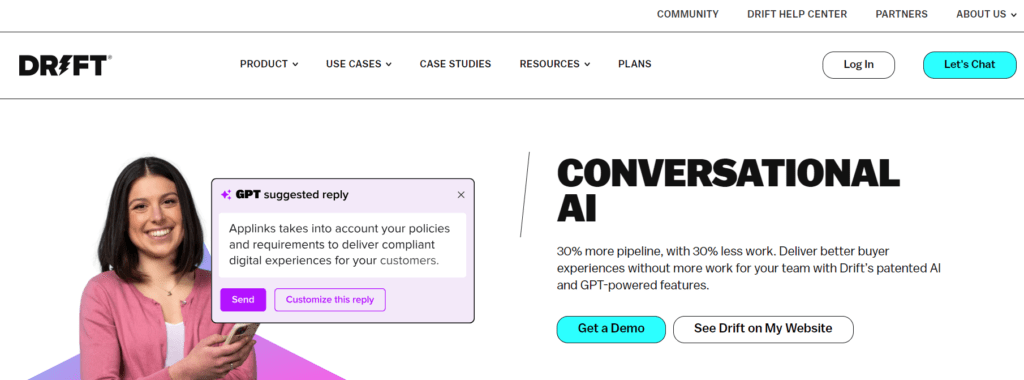Are you sceptical about the role of AI in business growth? While it’s understandable to have reservations about adopting new technologies, it’s important to recognize AI’s immense potential for your company’s success.
Integrating AI tools can revolutionize how you do business, leading to increased efficiency, improved decision-making, and a competitive edge in the market.
But what exactly can AI do for your business?
Stay tuned to discover the transformative advantages that AI integration brings and how it can propel your business to new heights.
Table of Contents
Key Takeaways
- AI drives innovation and efficiency in businesses, leading to growth.
- AI improves customer experiences and enables data-driven decision-making.
- AI automates tasks and optimizes processes, reducing costs.
- Businesses must address ethical concerns and develop strategic plans for successful AI integration.
The Importance of AI in Business Growth
Investing in AI is essential for businesses seeking to maintain a competitive edge and achieve growth in today’s dynamic market. The importance of AI in business growth cannot be overstated.
AI can transform businesses by driving innovation, increasing efficiency, and improving customer experiences. By leveraging AI solutions, businesses can streamline operations, automate repetitive tasks, and make data-driven decisions.
One of the key benefits of AI in business is its ability to enhance productivity. AI-powered tools can analyze large volumes of data faster than humans, enabling businesses to make quicker and more accurate decisions.
This saves time and allows businesses to respond more effectively to changing market conditions. Additionally, AI can help businesses identify new sales leads by analyzing customer data and predicting customer preferences.
Moreover, AI can also reduce call times and improve customer service. AI-powered chatbots can handle customer queries and provide instant responses, ensuring customers receive timely assistance. This not only improves customer satisfaction but also frees up employees to focus on more complex tasks.
Advantages of AI Integration
Integrating AI into your operations can unlock many advantages that enhance productivity, accuracy, and growth. One of the key benefits of AI integration is improved customer relationship management (CRM).
AI-powered tools can analyze large volumes of customer data, enabling you to gain valuable insights and make data-driven decisions. With personalized marketing, you can tailor your messages to individual customers, increasing engagement and conversion rates.
AI integration can help drive customer loyalty. By leveraging AI algorithms, you can analyze customer behaviour patterns and preferences, allowing you to offer personalized recommendations and experiences.
This level of customization can foster stronger connections with customers, leading to increased loyalty and repeat business.
In addition, AI-powered tools can streamline various business processes, saving time and resources. For example, AI chatbots can handle customer inquiries, freeing your employees to focus on more complex tasks.
AI algorithms can also optimize inventory management and supply chain operations, reducing costs and improving efficiency.

Top AI Chatbots for Online Businesses
Drift
Drift is a leading AI chatbot platform specialising in conversational marketing and sales solutions for e-commerce businesses.
Their chatbots are designed to engage and qualify website visitors in real time, providing personalized interactions and lead-generation support.
Drift’s AI chatbots can assist with product recommendations, answer customer queries, and even facilitate sales transactions, making them a valuable asset for e-commerce companies looking to enhance their customer experience and drive revenue.

Intercom
Intercom offers AI-powered chatbots that are well-suited for e-commerce websites. These chatbots can be integrated to provide personalized customer support, lead generation, and targeted interactions based on user behaviour.
Intercom’s AI chatbots are known for their ability to engage with online shoppers, answer product-related questions, and provide real-time assistance, ultimately contributing to improved customer satisfaction and increased sales for e-commerce businesses.
Zendesk Chat
Zendesk provides an AI chatbot solution that can be tailored to the specific needs of e-commerce businesses.
Zendesk Chat automate customer support interactions, provides order tracking, and offers personalized recommendations based on user preferences and browsing history.
Zendesk Chat’s AI capabilities can help e-commerce companies streamline their customer service processes and deliver a more efficient and personalized shopping experience to their customers.

LivePerson
LivePerson’s AI chatbots are well-regarded for their ability to enhance the customer experience in e-commerce. These chatbots can provide personalized product recommendations, assist with order tracking, and offer real-time support to online shoppers.
LivePerson’s AI chatbots seamlessly integrate with e-commerce platforms, providing valuable assistance to customers throughout their shopping journey and contributing to increased sales and customer satisfaction.
ManyChat
ManyChat specializes in AI chatbots for e-commerce businesses on messaging platforms like Facebook Messenger.
It automates customer interactions, provides personalized product recommendations, and facilitates sales transactions.
ManyChat’s AI chatbots can help e-commerce companies engage with their customers on popular messaging platforms, ultimately driving sales and improving customer satisfaction through personalized and automated interactions.
Enhancing Employee Productivity With AI
To enhance employee productivity, businesses can leverage the power of AI tools. Implementing AI tools in business can significantly enhance employee productivity and accuracy. AI can automate tedious administrative tasks, saving time and boosting productivity.
By caring for repetitive and time-consuming tasks, AI allows employees to focus on more complex and creative work, ultimately increasing their productivity and job satisfaction.
AI enhances customer service by providing personalized interactions and features like chatbots, improving customer relationships and loyalty.
With AI-powered tools, businesses can optimize content creation, analyze data for personalized marketing, and improve customer engagement. This enhances employee productivity and drives business growth by delivering better customer experiences.
Moreover, AI cybersecurity and fraud detection tools employ machine learning algorithms to detect anomalies and predict breaches, enabling proactive threat detection. By mitigating security risks, businesses can ensure a safe and productive work environment for their employees.
Improving Accuracy With AI Tools
As businesses leverage the power of AI tools to enhance employee productivity, another key benefit emerges: improving accuracy through AI integration.
Implementing AI tools like machine learning and deep learning can refine data performance and efficiency in various aspects, such as image/speech recognition, fraud detection, and predictive analytics.
AI tools enable proactive detection of potential threats and anomalies by analyzing large volumes of data to distinguish normal activities from suspicious ones.
AI-powered chatbots continuously improve accuracy and effectiveness by learning from customer interactions, reducing wait times and cutting staffing costs.
AI algorithms analyze data to suggest topics and headlines for personalized content creation based on audience preferences and performance, enhancing accuracy and relevance.
By integrating AI into customer service automation, businesses save time and resources by automating routine tasks, improving overall satisfaction, customer loyalty, and business growth.
With the help of artificial intelligence, businesses can achieve higher accuracy, efficiency, and customer satisfaction, unlocking new opportunities for growth and success.

Increasing Sales Leads With AI
How can AI revolutionize your sales strategy and drive an influx of qualified leads? With artificial intelligence, small businesses can transform their marketing strategies and increase sales leads.
Top three ways AI can help you achieve this:
- Personalized Marketing Campaigns: AI can analyze customer behaviour and preferences to create personalized marketing campaigns. By understanding your customers’ needs and interests, AI can target the right audience with the right message at the right time, leading to higher conversion rates and increased sales leads.
- Lead Identification: Machine learning algorithms can analyze large volumes of data to identify potential leads. By identifying patterns and trends, AI can pinpoint individuals most likely to become customers, helping you prioritize your sales efforts and maximize conversion rates.
- AI-powered Chatbots: AI-powered chatbots can engage with potential leads, answer their queries, and guide them through the sales process. These chatbots provide instant support, improving customer experience and increasing the chances of converting leads into customers.
Reducing Call Times With AI
Can AI revolutionize customer service by reducing call times and improving efficiency?
Absolutely! With the power of artificial intelligence (AI), businesses can significantly reduce call durations and enhance overall customer service.
AI tools, such as Natural Language Processing (NLP), enable AI chatbots to provide quick and accurate responses, leading to shorter call times.
AI-powered predictive analytics can anticipate customer needs, allowing for more efficient call resolutions. Automated voice recognition and speech synthesis technologies streamline call routing and information retrieval, further minimising call duration.
By integrating AI into customer service, businesses can optimize the call-handling process and improve overall efficiency. Personalized customer interactions made possible by AI enable faster issue resolution, reducing call handling time and enhancing customer satisfaction.
This saves time for both customers and agents and allows businesses to handle a larger volume of calls and improve productivity.
Reducing call times with AI is a game-changer for businesses. It not only improves customer service but also contributes to business growth. By leveraging the power of AI, businesses can enhance their customer service capabilities, increase customer satisfaction, and ultimately drive success.
Staying Competitive With AI Investment
By embracing AI investment, businesses can gain a competitive edge in the modern market while revolutionizing their customer service capabilities, from reducing call times to improving overall efficiency.
How AI investment can help businesses stay ahead:
- Enhanced Customer Intelligence: AI tools can analyze vast amounts of customer data to provide valuable insights into customer behaviour, preferences, and needs. This enables businesses to tailor their products and services to meet specific customer demands, resulting in higher customer satisfaction and loyalty.
- Streamlined Business Operations: AI-powered tools automate repetitive tasks, allowing employees to focus on more strategic and creative endeavours. This increased efficiency leads to improved productivity, reduced costs, and faster decision-making processes, allowing businesses to stay agile in a rapidly changing market.
- Personalized Customer Experiences: AI enables businesses to deliver personalized customer experiences at scale. Businesses can analyze customer data in real-time through machine learning algorithms and provide customized recommendations and offers. This level of personalization not only enhances customer satisfaction but also increases the likelihood of repeat purchases and referrals.
Investing in AI is no longer a luxury; it is necessary for businesses looking to thrive in today’s competitive landscape. By leveraging AI tools and technologies, businesses can unlock new opportunities, optimize operations, and deliver exceptional customer experiences. Stay ahead of the curve and embrace the power of artificial intelligence.
Understanding Security Implications of AI
To ensure the successful integration of AI into business operations, understanding the security implications is crucial for companies looking to stay ahead in today’s competitive landscape.
AI tools employ machine learning algorithms to detect anomalies and predict breaches in cybersecurity. However, it’s important to recognize that AI systems don’t possess a source of truth and can disseminate false information, leading to legal and ethical concerns.
Implementing AI in business involves challenges, such as ethical and legal implications, necessitating careful consideration. While AI integration into the workforce may create more jobs in the short term, the long-term impact on job availability is uncertain.
It’s also worth noting that AI has the potential to create more wealth than it destroys, but distribution may be unequal, highlighting the need to understand the security implications of integrating AI.
Integrating AI securely is essential for sustainable business growth and maintaining a competitive edge in the market. So, businesses can proactively address potential risks and vulnerabilities, protecting sensitive data and maintaining customer trust.

Addressing Ethical Concerns of AI Integration
Addressing the ethical concerns surrounding the integration of AI is crucial for businesses seeking to harness its potential effectively. As AI technology continues to advance and become more prevalent in the business world, it is important to address the following ethical concerns:
- Unintentional biases: AI systems can inadvertently perpetuate biases in the data they are trained on, leading to discriminatory outcomes. It is essential for businesses to actively mitigate these biases and ensure fairness and equality in AI-driven decision-making processes.
- Privacy issues: The integration of AI often involves collecting and analysing vast amounts of personal data. Businesses must prioritize data privacy and implement robust security measures to protect sensitive information from unauthorized access or misuse.
- Potential misuse of AI: AI can be misused for malicious purposes, such as disseminating false information or deepfake technology. Businesses should be vigilant in monitoring and regulating the use of AI to prevent its misuse and safeguard against its negative impacts.
Developing Digital Skills for Successful AI Implementation
Developing digital skills is essential for successfully implementing AI in business growth. As AI increasingly integrates into various industries, businesses must equip their employees with the necessary digital skills to effectively leverage artificial intelligence’s power.
By developing digital skills, businesses can create a workforce capable of understanding and utilizing AI tools and technologies to drive innovation, improve efficiency, and stay ahead in the competitive market.
| Benefits of Developing Digital Skills for AI Implementation |
|---|
| Increased productivity and efficiency |
| Improved decision-making and problem-solving abilities |
| Enhanced adaptability and agility |
| Expanded job opportunities and career growth |
| Empowered employees and a culture of innovation |
Finding AI Solutions That Benefit Employers and Employees
Employers and employees can benefit from finding AI solutions that streamline administrative tasks, enhance productivity, and improve customer experiences.
Businesses can achieve significant growth and success by integrating AI into their operations.
- Streamlined administrative tasks: AI tools can automate repetitive and time-consuming administrative tasks, such as data entry and report generation. This frees up valuable time for employees, allowing them to focus on more strategic and creative initiatives. Employers can also benefit from increased efficiency and reduced costs associated with manual administrative work.
- Enhanced productivity: AI solutions can improve employee productivity by providing personalized customer interactions and automating processes. For example, AI-powered chatbots can handle customer inquiries, allowing employees to focus on more complex and value-added tasks. This improves job satisfaction and leads to increased productivity and business growth.
- Improved customer experiences: AI applications can analyze large volumes of data to gain insights into customer behaviour and preferences. This enables businesses to deliver personalized experiences and tailor their products and services accordingly. By providing exceptional customer experiences, employers can enhance customer loyalty and drive business growth.
Finding AI solutions that benefit employers and employees is crucial for business growth and success. By leveraging AI technology, businesses can streamline operations, enhance productivity, and deliver exceptional customer experiences.
Embracing AI empowers businesses to stay competitive and liberates employees from mundane tasks, allowing them to focus on more meaningful and rewarding work.
How AI Transforms Businesses
By embracing AI technology, businesses can revolutionize their operations and achieve significant growth and success. AI has the power to transform businesses in various ways.
One of the key benefits of AI is automation. With AI tools, businesses can automate repetitive tasks, freeing up valuable time for employees to focus on more strategic and creative work. This increased efficiency leads to improved productivity and overall business growth.
AI also enables businesses to analyze vast amounts of data and make predictions. Machine learning and deep learning algorithms process this data, identify patterns, and provide valuable insights.
This allows businesses to make more informed decisions and take proactive action. For example, AI can help with fraud detection and prevention, ensuring the security of financial transactions. AI can also optimize customer relationship management by providing personalized experiences and targeted marketing campaigns.
AI transforms the way businesses access and target audiences. By using data, AI provides relevant information and customizes user experiences. This not only enhances customer satisfaction but also increases sales leads.
AI can analyze customer preferences and behaviour to suggest products or services that align with their needs, resulting in higher conversion rates.
Exploring the Uses of Machine Learning in AI
Machine learning is vital in implementing AI, enabling businesses to unlock their full potential and drive innovation.
- Marketing Optimization: By using AI and machine learning algorithms, businesses can analyze large amounts of customer data to identify patterns and trends, allowing for more targeted and personalized marketing campaigns. This leads to increased customer engagement, higher conversion rates, and improved sales.
- Fraud Detection: Machine learning algorithms can analyze vast amounts of data and detect anomalies that may indicate fraudulent activities. Businesses can proactively identify and prevent fraudulent transactions using AI, protecting themselves and their customers.
- Process Automation: AI and machine learning can automate repetitive and time-consuming tasks, freeing employees to focus on more strategic and creative work. This improves efficiency and productivity and reduces costs and human error.
AI’s Role in Cybersecurity
AI enhances cybersecurity defences by employing machine learning algorithms to detect anomalies and predict breaches in real-time. With the increasing sophistication of cyber threats, businesses can use AI to bolster their cybersecurity strategies and stay one step ahead of potential attacks.
AI tools like Darktrace and CrowdStrike analyze large volumes of data to distinguish normal activities from suspicious ones, enabling proactive threat detection. By continuously learning from patterns and behaviours, AI can recognize threats and vulnerabilities that may go unnoticed by human analysts.
This real-time threat detection and automated incident response provided by AI tools are essential for businesses to combat evolving cyber threats effectively. Integrating AI into cybersecurity improves the overall security posture, reduces response times, minimizes human error, and saves resources.
The impact of AI in cybersecurity is transformative, empowering businesses to protect their sensitive data and critical infrastructure with greater efficiency and accuracy.
As businesses continue to navigate the digital landscape, harnessing the power of AI is imperative to safeguard against potential cyber-attacks and ensure the long-term success and growth of the organization.
Enhancing Customer Relationship Management With AI
Implementing AI in customer relationship management systems can revolutionize how businesses interact with their customers, improving satisfaction and personalized experiences.
- Automating routine tasks: AI can automate repetitive tasks, such as data entry and follow-up emails, allowing employees to focus on more strategic activities.
- Providing insights into customer behaviour: AI-powered analytics can analyze large volumes of customer data and provide valuable insights, enabling businesses to understand customer preferences and tailor their offerings accordingly.
- Enhancing overall customer satisfaction: AI can help businesses deliver faster and more accurate customer service through chatbots and automation tools. This not only improves response times but also saves time and resources.
AI’s Impact on Internet and Data Research
Revolutionizing the way businesses conduct internet and data research, AI technology utilizes data to identify patterns in search behaviours and provide relevant information.
Using machine learning algorithms, AI can gather and analyze vast amounts of data, enabling businesses to gain valuable insights and make informed decisions.
With AI’s impact on the internet and data research, businesses can target specific audiences more effectively and customize the user experience. This technology is shifting how information finds users, allowing businesses to optimize their online presence and precisely reach their target market.
Small businesses can particularly leverage AI to enhance their internet and data research efforts. With AI tools, they can gather data on customer preferences, behaviours, and trends, allowing them to tailor their marketing strategies and offerings accordingly.
This level of personalized research enables small businesses to compete with larger companies and reach their target audience on a more intimate level.
Furthermore, AI’s impact on internet and data research extends beyond targeting audiences. It also improves the overall efficiency and accuracy of data collection and analysis.
AI can quickly sift through large volumes of information, identify patterns, and provide businesses with actionable insights. This saves time and ensures businesses have the most up-to-date and relevant information to inform their decision-making processes.
The Rise of Digital Personal Assistants
Digital personal assistants have transformed how individuals interact with technology, offering hands-free and voice-activated assistance in our daily lives.
With the power of AI, these assistants can perform routine tasks and provide a customizable experience tailored to your needs.
- Streamlined Productivity: Digital personal assistants can help you manage your schedule, set reminders, and send messages, allowing you to focus on more important tasks. By using artificial intelligence, they can understand natural language commands, making it easier and faster to perform everyday tasks.
- Enhanced Convenience: With digital personal assistants integrated into various devices, you can control your smart home appliances, play music, and even order groceries with a simple voice command. This seamless, hands-free experience saves time and effort, liberating you from mundane activities.
- Personalized Assistance: These assistants learn from your preferences and behaviour, providing a personalized and customized experience. By utilizing AI algorithms, they can offer recommendations, suggest relevant information, and adapt to your specific needs, empowering you to make informed decisions.
The rise of digital personal assistants signifies the increasing power of AI in our daily lives. As they evolve, these assistants will simplify our routines, provide convenience, and offer a more personalized experience.
Embrace digital personal assistants’ liberation and efficiency, and let AI enhance your daily interactions with technology.
The Future of AI in Business
As businesses continue to embrace the power of AI, the future of AI in business holds immense potential for transforming operations and driving growth. AI is essential for maintaining a competitive edge in business operations and enhancing functions and processes.
Machine learning and deep learning play critical roles in achieving these goals. AI has numerous benefits, including improved employee productivity, accuracy, and increased sales leads. It also reduces call times, resulting in enhanced customer satisfaction.
Common uses of AI in business include cybersecurity, customer relationship management, and data analysis. AI in internet and data research allows for more customizable user experiences and effective audience targeting.
However, it is important for businesses to actively address security implications and ethical concerns associated with AI integration.
Developing digital skills in employees and finding AI solutions that benefit both employers and employees are key to successful AI implementation.
The future impact of AI on the workforce is expected to create a knowledge-based economy with job adaptations and changes in workforce structure. Embracing AI as a tool for business growth is crucial to stay competitive and take advantage of transformational opportunities.
AI’s Effect on the Workforce
AI’s impact on the workforce is a topic of ongoing debate and discussion. Here are some key points to consider regarding AI’s effect on the workforce:
- AI investments are increasing: Businesses reported investing billions of dollars in AI technologies. This shows that companies recognize the potential for AI to transform their operations and drive growth.
- Job displacement is a concern: While AI technology is not replacing jobs entirely, there is a possibility that certain roles may be automated. White-collar jobs like business analysts and lawyers, which heavily rely on data processing and analysis, are more susceptible to being replaced by algorithms.
- The workforce is evolving: The integration of AI is changing the structure of the workforce. It creates a knowledge-based economy where employees must acquire new digital skills to adapt to the changing job landscape.
Despite concerns about job displacement, the future of AI in the workforce may create more jobs in the short term. According to reports, AI has the potential to generate millions of jobs as businesses embrace AI technologies and implement them in various industries.
However, the impact of AI on the workforce is still debated, and businesses need to actively address the ethical and societal implications of AI integration to ensure a fair and inclusive future.
Job Creation Potential of AI
The potential for job creation through AI technology is still a topic of ongoing debate and exploration. While some argue that AI will replace jobs, the current evidence suggests otherwise.
AI integration can create more jobs in the short term, leading to a knowledge-based economy. The adoption of AI in businesses is crucial for their growth and success.
This technology is essential for companies to stay competitive and not miss out on transformational opportunities. Addressing ethical concerns and understanding the security implications of integrating AI into business operations is important.
Businesses should focus on developing digital skills in employees and finding AI solutions that benefit both employers and employees. The potential of AI to create wealth is significant, but it is crucial to ensure equal distribution of these benefits.
AI in the workplace will likely fragment workflows, leading to the creation of new human jobs.
Planning for the Post-Transition Period
With AI becoming increasingly integrated into businesses for growth and success, planning for the future beyond the initial implementation phase is crucial.
- Leveraging machine learning: Embrace the power of AI technology by leveraging machine learning algorithms. By analysing vast data, AI can provide valuable insights and predictions to inform business decisions. Whether optimizing supply chain management or enhancing customer experience, machine learning can unlock new growth opportunities.
- Adapting to the digital landscape: The digital landscape constantly evolves, and businesses must stay ahead of the curve. Monitor emerging technologies and industry trends to identify how AI can further enhance your operations. You can maintain a competitive edge and ensure sustained business growth by proactively adapting to the changing digital landscape.
- Strategic planning for long-term success: Successful AI integration requires strategic planning. Consider the long-term implications and potential challenges associated with AI implementation. Evaluate the risks and benefits, address ethical concerns, and develop a comprehensive roadmap for AI adoption. This proactive approach will ensure that your business is well-prepared to navigate the post-transition period and capitalize on the full potential of AI technology.
Shifting Towards Specialized Skills in the AI Era
To thrive in AI, businesses must embrace specialized skills that drive innovation and growth. As AI becomes more prevalent, there is a shift towards specialized skills in high demand. Machine learning, deep learning, natural language processing, and robotics are increasingly valuable in the business world due to the expanding role of AI.
To harness the full potential of AI for growth and innovation, businesses seek professionals with expertise in AI technologies and applications.
The demand for AI specialists is driven by the need to leverage AI for data analysis, customer experience enhancement, marketing automation, and cybersecurity. Businesses recognize the importance of these specialized skills in achieving business growth with AI.
Employees need to upskill in data analysis, coding, and ethical considerations to contribute to and navigate the evolving AI applicability in the workforce effectively.
Embracing AI as the Future of Business
Embrace AI as the future of your business and unlock its transformative potential for growth and innovation. Integrating artificial intelligence (AI) technologies like machine learning and deep learning can revolutionize your business operations and set you apart from competitors.
- Enhanced Efficiency: AI tools can streamline business operations, automate administrative tasks, and improve efficiency. By leveraging AI, you can optimize workflows, reduce manual errors, and free up valuable time for your employees to focus on more strategic and creative tasks.
- Improved Customer Experiences: AI can significantly enhance customer experiences by personalizing interactions and recommendations. You can provide instant and accurate support with AI-powered chatbots and virtual assistants, increasing customer satisfaction and loyalty.
- Data-Driven Decision Making: AI enables you to analyze vast amounts of data and extract valuable insights quickly. By leveraging AI’s predictive capabilities, you can make data-driven decisions, identify trends, and anticipate customer needs, ultimately driving business growth and innovation.
Leveraging AI to Grow Your Business
Unlock your business’s growth potential by harnessing AI’s power to drive innovation and efficiency. Leveraging AI can be a game-changer for your business growth. AI algorithms, such as machine learning and deep learning, can quickly process large amounts of data, identifying patterns and anomalies that can improve your business processes.
One area where AI can significantly impact your business growth is customer relationship management. AI-powered chatbots can handle customer inquiries, reducing response times and improving customer satisfaction.
AI can also analyze customer data, providing valuable insights into customer preferences and behaviour, which can inform your marketing and sales strategies.
Furthermore, AI can revolutionize your cybersecurity efforts. AI algorithms can detect and respond to threats in real-time, safeguarding your business from cyber-attacks and data breaches. This protects your business and customers and enhances your reputation and credibility.
Incorporating AI into your business can also open up new growth opportunities. AI-driven data research can uncover untapped markets and customer segments, allowing you to expand your reach and increase sales leads. Additionally, AI-powered automation can optimize your supply chain management, reducing costs and improving efficiency.
Investing in the necessary infrastructure, talent, and training is crucial to leverage AI effectively. Partnering with AI experts or leveraging AI platforms can help you navigate the complexities of AI implementation and maximize its potential for your business growth.
Overcoming Challenges in AI Implementation
Overcoming challenges in AI implementation requires careful consideration of legal and ethical implications and thoughtful integration and implementation of new AI technologies.
To successfully adopt AI and embrace its potential for business growth, you need to look into the following:
- Identify legal and ethical implications: Understand the regulatory landscape surrounding AI and ensure compliance with data privacy and security regulations. Additionally, ethical guidelines should be established to govern AI system behaviour and decision-making.
- Address compatibility and infrastructure: Integrate new AI technologies seamlessly with existing systems and infrastructure. Ensure compatibility to maximize efficiency and minimize disruptions during implementation.
- Ensure data privacy and security: Safeguard sensitive data by implementing robust security measures. Protecting customer information and maintaining data integrity is crucial to building trust and avoiding potential legal consequences.
Frequently Asked Questions
How to Drive Business Growth With AI?
You can drive business growth with AI by leveraging its benefits, such as enhancing productivity, improving accuracy, increasing sales leads, and reducing call times. Investing in AI is essential to stay competitive and seize transformational opportunities.
What Is the Future of Business With AI?
The future of business with AI is promising. It will revolutionize industries, enhance productivity, and create new opportunities. Embrace AI to stay competitive, improve efficiency, and unleash the full potential of your business.
How Will AI Affect Business in Future?
AI will revolutionize business by increasing productivity, accuracy, and sales leads. Investing in AI is vital for staying competitive and seizing transformational opportunities. However, it’s crucial to understand security implications, address ethical concerns, and develop digital skills for successful implementation.
Will AI Increase Economic Growth?
AI has the potential to increase economic growth significantly. By automating tasks, improving efficiency, and enabling better decision-making, AI can drive productivity and innovation, leading to economic expansion and creating new opportunities for businesses and individuals.
Conclusion
Embracing AI technology is crucial for businesses seeking growth and success in today’s competitive marketplace.
By integrating AI tools, companies can enhance employee productivity, improve accuracy, generate more sales leads, and reduce call times.
Investing in digital skills and finding AI solutions that benefit employers and employees are key considerations for successful implementation.
Don’t miss out on AI’s transformational opportunities – unlock your business’s full potential with AI.







